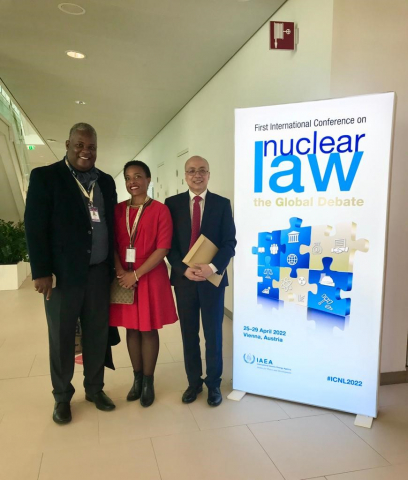
(L-R) Senior Legal Officer, Chair of the Radiation Safety and Protection Committee at the University Hospital of the West Indies, Dr Peter Glegg; Senior Lecturer and Associate Dean, Outreach and Continuing Legal Education, MonaLaw, Dr Natalie Corthesy and– Consultant, International Atomic Energy Agency, Mr Xiaodong Yang all pictured at the recently hosted IAEA’s First International Conference on Nuclear Law: The Global Debate in Vienna, Austria (April 25-29, 2022).
Jamaica is among six countries that recently signed an agreement with the International Atomic Energy Agency (IAEA) signalling a partnership to increase education and professional development in the area of international and national nuclear law.
In addition to The University of the West Indies, Mona, the agreement was inked with universities in Argentina, Brazil, Egypt, South Africa and the United Arab Emirates, and will help to increase education and professional development in this field. The signing ceremony took place during the IAEA’s First International Conference on Nuclear Law: The Global Debate in Vienna, Austria (April 25-29, 2022).
The partnership means legal professionals studying in Jamaica at The UWI, Mona will have the opportunity to develop their competency in nuclear law as a result of the IAEA-supported programme.
Speaking about what this means for The UWI, Dean of the Faculty of Law, Prof Shazeeda Ali said “We are truly delighted to be among the select few universities that will be involved in the delivery of a certificate course in nuclear law. This initiative will enable MonaLaw to be well poised to ensure that this important, but relatively unknown, area of the law attains a greater level of attention, particularly by those involved in the fields of nuclear science and technology.”
Addressing the attendees of the signing ceremony, Rafael Mariano Grossi, Director General of the IAEA said, “In nuclear law, the way people are introduced to the subject – whether they are introduced at all – will determine its future shape, and in consequence, it will influence how the atom benefits future generations.”
In a press release issued by the IAEA, the organization indicated that the partnership will build awareness of nuclear law as a pre-requisite for safe and peaceful applications of nuclear science and technology among operators, regulators, lawyers, engineers and policymakers and to build teaching capacity in the field.
Also addressing the signing ceremony attendees was Pro Vice-Chancellor of the University of Witwatersrand, South Africa, Imraan Valodia who said “When it comes to nuclear law there are too few opportunities for lawyers or engineering students to get exposed to something so essential for the nuclear field: the legal framework that is underlying all the activities.”
According to the IAEA news release, they will be working with each of the six institutions to develop courses and modules on the four branches of nuclear energy– safety, security, safeguards, and liability. The goal is for these modules and courses to support existing national and or regional training in the field. The courses in nuclear law will be open to students from diverse academic backgrounds and interests including law, engineering, policy, and communications, while smaller modules will be integrated into existing courses.
Sharing her thoughts on the utility of capacity building in nuclear law in the Jamaican/Caribbean context, Senior Lecturer and Associate Dean, Outreach and Continuing Legal Education at MonaLaw, Dr Natalie Corthesy said: “ This represents an unparalleled opportunity to collaborate with the other five universities who have also become signatories to the IAEA's agreement on the introduction of nuclear law programmes in tertiary institutions. Beyond the offer of technical assistance, the scope for joint partnerships will auger well for the sharing of teaching methodologies and the standardisation of course content of this highly specialised area of law.”
The IAEA press release further informed that upon successful completion of the academic requirements and an internship at a national regulatory body, operator, or relevant organizations, the students will receive a postgraduate certificate in nuclear law.
The initiative, the IAEA release continued, will be implemented within the framework of the IAEA Legislative Assistance Programme, which is supported by the Technical Cooperation Programme. Through the Legislative Assistance Programme, the IAEA supports governments in adhering to and implementing international legal instruments in the nuclear field and in developing corresponding national legal frameworks.

